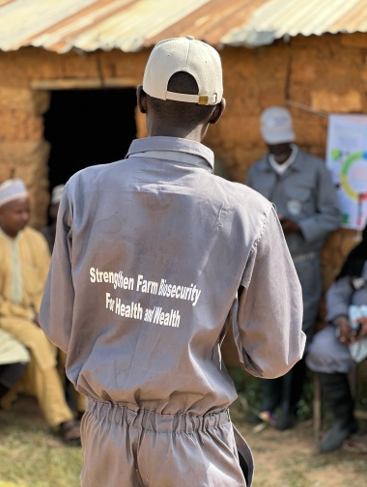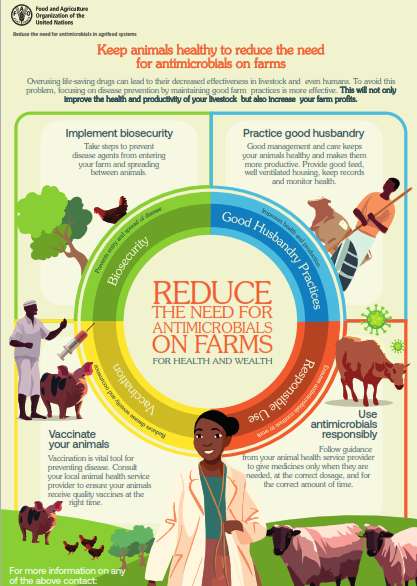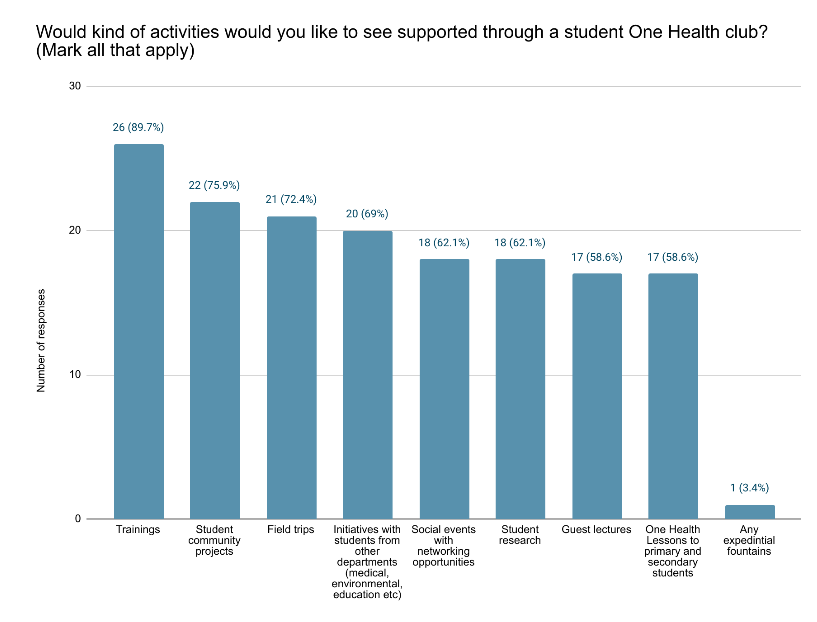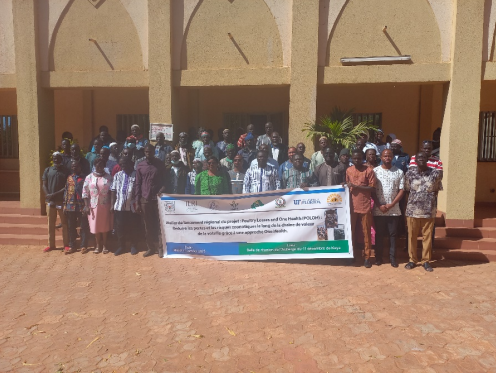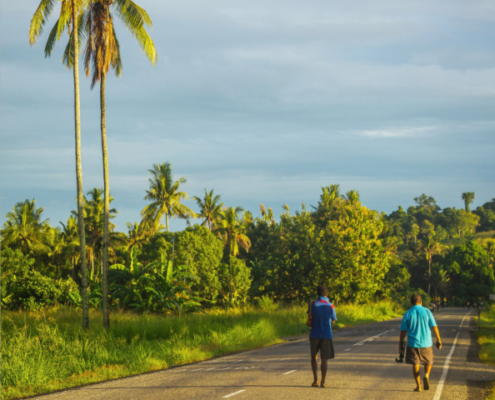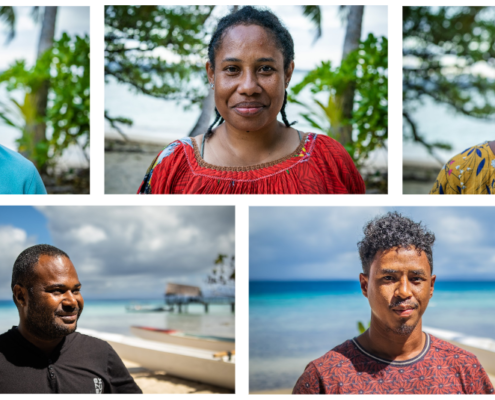One Health, One Welfare, Many Impacts
By Eliza Smith, Kyeema Technical Manager & One Health practitioner
Kyeema works across a diverse One Health portfolio. The One Health approach, as described by the One Health Initiative Task Force, calls for “the collaborative efforts of multiple disciplines working locally, nationally, and globally, to attain optimal health for people, animals and our environment”. When explained, most people understand the concept of One Health, as the connection between the health of people, animals, and the environment, particularly in terms of zoonotic disease prevention and control (those diseases that can be transmitted from animals and vice versa). However, sometimes they have trouble understanding the range of implications the One Health approach can have. On the eve of this year closing, let me reflect on and explain some of these, with examples from project activities across our organisation in 2023.
Photo credit: FAO Nafinatu Abdullahi/Veterinary paraprofessionals and farmers participating in the Farm Biosecurity and One Health training in Nigeria on the FMM project.
Improved health and wealth for farmers through improved biosecurity
Working with the Food and Agriculture Organisation (FAO) of the United Nations, Kyeema took the lead coordination role in a Flexible Multi-partner Mechanism (FMM) project ‘Equipping Veterinary Paraprofessionals and Local Service Providers: Improving services to primary producers and smallholder farmers for better production and One Health’. The project brought together private and public sector animal health service providers in Nigeria, Uganda and Samoa in a blended (online and in person) training designed to improve their skills in assisting livestock farmers to focus on disease prevention and safe production practices. This as a sustainable alternative to overuse (and misuse) of antimicrobials to treat disease or to promote growth to market as a quick fix. Such an approach involves improving animal husbandry, hygiene, segregation, vaccination and prudent use of antimicrobial practices, which improves production more reliably, improves the availability of good quality milk, meat and eggs, and reduces the risk of potentially life threatening zoonotic disease and antimicrobial resistance (in humans and animals) becoming a problem for farming families and communities.
Improved multi-sector communication to face the significant global health challenges before us
As part of the same FAO FMM project, Kyeema led a study to explore regional One Health Information Exchange Networks (OHIENs) in East and West Africa. The purpose of the study was to understand the enabling environments for improved biosecurity and One Health communication between public health, animal health and conservation and natural resource management departments and field professionals. The study explored OHIENs in Nigeria, Liberia, Uganda and Ethiopia, countries with huge risk or recent history of significant zoonotic disease outbreaks with pandemic potential, namely Ebola. Lessons learned and recommendations were captured across these countries for establishing national oversight of regional level One Health Task Force implementation of multi-disciplinary disease prevention, surveillance and crisis outbreak management as well as antimicrobial resistance research and prevention and adaptation to climate change. The results of the study will support field level service providers (in community health, agriculture and conservation) to be more engaged in information sharing for better biosecurity and One Health outcomes in both regions.
Gender empowerment to improve the nutrition, health and wellbeing of generations to come
Kyeema also contributed to the development and delivery of the blended training of the FAO ‘Female Leadership in One Health course for Veterinary Paraprofessionals and Community Health Workers’ piloted in Nigeria, with broader West Africa participants undertaking the online component.
The course aims to address gender-specific challenges in their work and guide women in farming communities on the prevention of infectious diseases, other One Health risks and to improve nutrition security. It explores how human and animal health professionals can work together using a One Health approach to empower women in this aim. The course is targeted at women, though we welcomed men to engage, learn and become genuine allies for female empowerment as well. The course team and participants were truly multidisciplinary and represented diverse female and male voices with different skills and experiences. All were excited to have the opportunity to unpack and troubleshoot the specific challenges for women, including gender-based violence and discrimination, as well as cultural norms and taboos, that negatively impact on family and community nutrition, health and mental wellbeing. Participants were thrilled to gain communication and leadership skills to be female One Health champions alongside their male One Health champion counterparts. We look forward to the scaling of this course across Africa and the globe.
Source: FAO/ Extension material produced for veterinary paraprofessionals as part of a Reduced Need for Antimicrobials on Farms (RENOFARM) toolkit piloted on the FMM project.
Source: Kyeema/ Results from survey report engaging university students in development of One Health student club.
Building the collaborative skills of the next generation of professionals and businesspeople
In Ethiopia, we have developed partnerships with Addis Abiba University and Bahir Dar University veterinary departments to support the next generation of One Health champions to network and collaborate with students from other disciplines and engage rural communities for improved health and livelihood outcomes. With support from the Australian NGO Cooperation Program, we have engaged final year veterinary students in sustainable smallholder poultry disease control training and follow up surveys on how to shape forthcoming Kyeema supported activities including One Health student clubs and a graduate business challenge in 2024. Students are looking forward to working with business, medical, agriculture and environmental science students to bid for the opportunity to be financially supported to start up businesses upon graduation. The businesses chosen will pilot innovative solutions for sustainable animal health delivery through private-public initiatives. The students are also looking forward to participating in One Health trainings, community projects, and relevant field trips through the Kyeema supported One Health club at each university.
Maintaining biodiversity for future food and livelihoods security
In Fiji and in Papua New Guinea, through generous support from DFAT and WWF, we are supporting a community-driven restoration and preservation of coral reef and associated coastal habitats, using an approach that accelerates natural adaptive processes of corals and lessens the impact of destructive fishing practices, by promoting an alternative protein and income source in the form of improved production (and availability) of local breed village chickens. We entered our second year of the project in 2023 and have developed and delivered several inclusive trainings and training resources. In 2024 communities will be able to demonstrate the initial positive ecological and social outcomes of this pilot nature-based solution, which in the long term will impact the health of humans, animals and their shared environment. As an ecologist and lover of traditional culture, I personally value the strength of this project model and its community partners to strive for resilience through the lens of biodiversity, or perhaps more appropriately, biocultural diversity.
A safer, sustainable and more productive poultry sector
In Burkina Faso, we are also contributing to the Poultry Losses and One Health (POLOH) project with funds through the USAID Feed the Future Innovation Lab for Livestock Systems. The project aims to reduce losses and zoonotic risks along the poultry value chain using a One Health approach. The target participants are smallholder poultry farmers, who face the most significant health risks and potential livelihood benefits of improved production. The activities seek to promote the careful management of both the positive and negative health and welfare outcomes of increased livestock production for humans, animals and the environment.
Photo credit: ILRI Michel Dione/Participants at the POLOH stakeholder workshop in January 2023.
What a busy year it has been in this space! With strong divisive sentiment permeating Australia and the world this year, it has been deeply motivating to be part of delivering such positive collaborative work. One Health and Welfare grounds us with a responsibility to work towards health, peace and prosperity for all, not just for some, for generations to come. The Kyeema team looks forward to expanding this work with a growing network of partners in 2024 and beyond.


